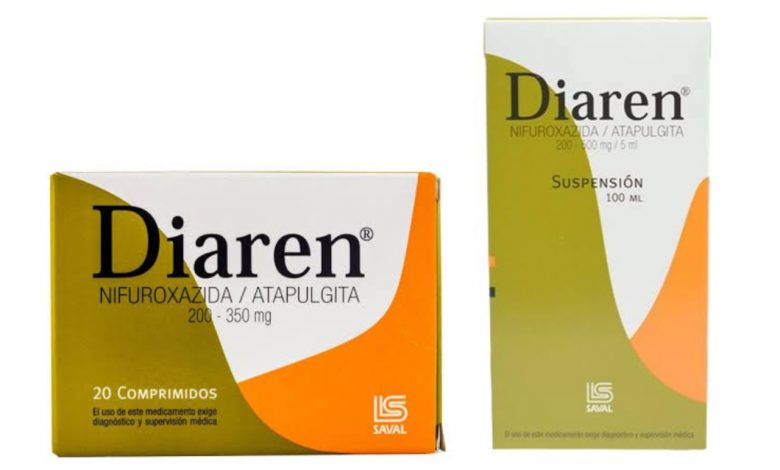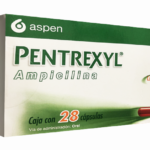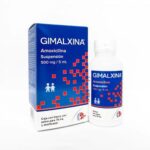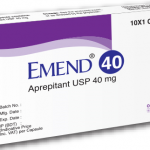Diaren: Uses, How to Take It, Side Effects, Interactions

Diaren is a combination medication containing nifuroxazide and attalpugite. It is used in the treatment of acute bacterial diarrheas in children and adults, and chronic diarrheas.
Diarrhea is usually a symptom of an infection in the intestinal tract, which can be caused by a variety of bacterial, viral, and parasitic organisms. Infection is spread through contaminated food or drinking-water, or from person-to-person as a result of poor hygiene.
Each tablet of Diaren contains nifuroxazide 200 mg and activated attalpugite 350 mg as active ingredients. While each 5 ml of Diaren oral suspension contains nifuroxazide 200 mg and activated attalpugite 500 mg
Diaren is manufactured by Saval Pharmaceuticals and the tablets come in a pack of 20 and the suspension is in a 100 ml bottle.
How it works
Nifuroxazide is an oral nitrofuran antibiotic, patented since 1966, It is an often used anti-diarrhoeal medicine that has been pushed back from routine practice in recent years and often replaced with probiotics. Nifuroxazide works by disrupting pathogenic metabolism and interfering with nucleic acid synthesis in diarrhea-causing pathogens.
Attapulgite the second active ingredient in Diaren is an oral, nonabsorbed medication that is used in the management of diarrhea. It works by adsorbing (binding) large numbers of bacteria and toxins and reducing the loss of water.
In synergy, these two medications (nifuroxazide and attalpugite) work to treat and prevent diarrheal diseases caused by susceptible microorganisms in the absence of suspicion of invasive germs.
Who should not take Diaren?
You should not take Diaren if:
- Child under 2 years of age.
- Hypersensitive to any of the components in Diaren or hypersensitive to nitrofuran derivatives.
- Have intestinal obstruction or suspicion of it.
How is Diaren taken?
The recommended dosage of Diaren for adults and children over 13 years is 1 tablet or 1 teaspoon of 5 ml of suspension every 6 hours (4 times a day). The usual pediatric dose for children 2 to 12 years is 1 teaspoon of 5 ml every 8 hours (3 times a day).
Follow the directions on your prescription label carefully, and ask your doctor or pharmacist to explain any part you do not understand. Take Diaren exactly as directed. Do not take more or less of it or take it more often than prescribed by your doctor.
Continue to take this medication even if you feel well. Do not stop taking it without talking to your doctor. If you stop taking this medication too soon or skip doses, your infection may not be completely treated and the bacteria may become resistant to antibiotics.
If after 3 days of treatment and the diarrhea persists, the treatment should be re-evaluated. In cases of infectious diarrhea with invasive clinical characteristics (dysenteric syndrome), the administration of systemic antibacterials is recommended. Concomitant with Diaren administration, rehydration should be maintained to compensate for fluid loss due to diarrhea. A diet that excludes raw vegetables, fruits, irritating foods, frozen foods, or carbonated beverages is also recommended. It is recommended to use with caution in geriatric patients since they usually have a slow intestinal transit and could present constipation after treatment. Due to the adsorbent properties of Diaren, its use could decrease the absorption of other medicines.
What are the side effects of Diaren?
The common side effects of Diaren are:
- Skin rashes
- Urticaria
- Edema
- Imbalance in plasma electrolytes
- Constipation
- Dyspepsia
- Flatulence
- Nausea and vomiting
Anaphylactic shock may occur in patients allergic to any of the components in Diaren. Dizziness and headache have also been described as adverse reactions to Diaren although these are considered rare.
Can I drink alcohol while taking Diaren?
No, avoid caffeine and alcohol instead you should drink plenty of liquids, including water, broth, and juices. You can also add semisolid and low-fiber foods gradually as your bowel movements return to normal. Try soda crackers, toast, eggs, rice, or chicken.





